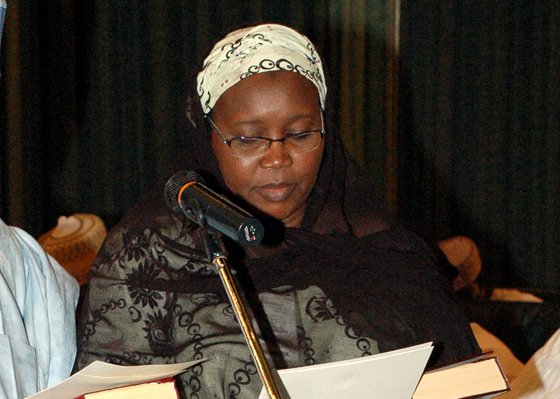INEC Commissioner has revealed that Mrs Amina is Buhari’s sister step daughter….in extension Buhari’s niece.
The commission stated this in a publication made available to Igbere TV by Mohammed Haruna, INEC National Commissioner and member of Information, Voter Education and Publicity Committee, on Friday in Abuja.

Haruna in the publication titled: “INEC In The Last Three Years” said that since INEC’s last governorship election in Osun on Sep. 22, the entire commission had come under attack from several quarters, including media organisations, as being deficient.
He said that since 2015, INEC had conducted about 195 odd elections, including seven off-season governorship elections, a dozen senatorial and two dozen federal constituency elections and scores of State Assembly and Federal Capital Territory Area Council (FCT) elections.
He added that out of these 195 odd elections only a handful had been successfully challenged in courts and in none of them did the courts order wholesale re-runs.
Haruna also cited media report where the Peoples Democratic Party (PDP) Governors’ Forum issued a statement in which it passed a vote of no confidence in the commission.
He said that the governors also accused INEC of conducting itself as a tool of the APC-led Federal Government, especially with the roles of the Chairman, Prof. Mahmood Yakubu, and a National Commissioner, Mrs Amina Zakari.”

Haruna said that the newspaper raised the public concern on the appointments of Yakubu as INEC chair and Zakari, which it stated violated a “tradition” of presidents appointing persons from regions other than theirs as chairmen of INEC.
Haruna explained that since independence in 1960 the Commission has had 12 chairmen, seven of them appointed by the military leaders between 1976 and 1999.
“All seven military-appointed chairmen were Southerners. All the military leaders, except General Olusegun Obasanjo as military leader between 1976 and 1979, were Northerners.’’
He said that it would then seem that the popular notion articulated by the newspaper of INEC’s chair coming from a region other than that of the serving president is correct. “In reality it is not.
“It is 23 years between 1976 and 1999 which, in certain contexts, is a long time. It is, however, debatable that a 23-year practice, being just about a generation, is long enough to be considered a tradition in the true sense of the word.
“But even if it is, it was military tradition and the appointment of Prof. Yakubu as INEC Chairman was not the first to break with that “tradition.
“What broke with it was the appointment in 2000 of Dr Abel Goubadia, a Southerner, as INEC’s Chairman by President Olusegun Obasanjo, a fellow Southerner, followed by that of Professor Maurice Iwu, another Southerner, by the same president in 2005.
“Indeed, as military head of state back in the late seventies, Obasanjo appointed a fellow Southerner, Chief Michael Ani, as the chair of the Commission which conducted the 1979 election that ushered in the Second Republic.’’
Haruna added that a president’s power to appoint members of the Commission was not absolute; it was subject to approval by the Senate.
He also explained that contrary to widespread belief, Zakari was not a blood relation of President Buhari. Her mother was from Daura, alright, but she was not Buhari’s sister.
“It is also true that Buhari’s sister was once married to Mrs Zakari’s father. But this was over 60 years ago before Mrs Zakari was born. Besides, the marriage was short-lived and did not produce a child.’’
Haruna said that nepotism and geographical origin in the composition of INEC’s membership, as in the composition of any other organ, should, of course, be of public concern.
“However, what should be of far greater concern is the character, diligence and competence of the members, not whose relations they are or where they come from.
He said that in spite of challenges facing INEC, the commission was ready to deliver more credible elections in 2019 than it did i






